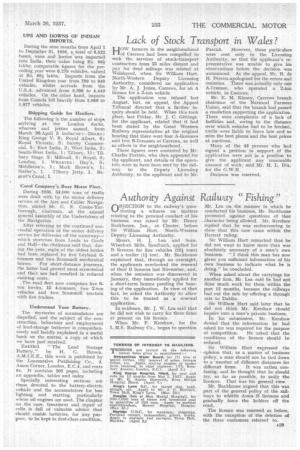Authority Against
Page 31

If you've noticed an error in this article please click here to report it so we can fix it.
Railway "is ing h* " rIBJECTION to the railway's ques
tioning a witness on matters relating to the personal conduct of his business was raised by Mr. Henry Backhouse, Jun., at Chester, before Sir William Hart, North-Western Deputy Licensing Authority.
Messrs. H. J. Lea and Sons, Wheelock Mills, Sandbach, applied for B licences for five vehicles (22i tons) and a trailer (11 ton). Mr. Backhouse explained that, through an oversight, the applicants overlooked the renewal of their B licences last November, and, when the omission was discovered in January, they immediately applied for a, short-term licence pending the bearing of the application. In view of that fact, he asked the Authority to allow this to he treated as a renewal application.
In evidence, Mr. J. W. Lea said that he did not wish to carry for three firms at present on his licence.
When Mr. P. Kershaw, for the L.M.S. Railway Co., began to question
Mr. Lea on the manner in which he conducted his business, Mr. Backhouse protested against questions of that character being allowed. Mr. Kershaw replied that he was endeavouring to show that this case came within the Barratt ruling.
Sir William Hart remarked that be did not want to know more than was absolutely necessary of a man's own business. "I think this man has now given you sufficient information of his own business to indicate what he is doing," he concluded.
When asked about the carryings for another firm, Mr. Lea said he had not done much work for • them within the past 12 months, because the railways had cut the rate by offering a through rate to Dublin.
Sir William Hart said later that he did not think Mr. Kershaw should inquire into a man's private business.
In his submission, Mr. Kershaw denied that the information he had asked for was required for the purpose of competition. He asked that the conditions of the licence should be reduced.
Sir William Hart expressed the opinion that, as a matter of business policy, a man should not be tied down to a number of different distances for different firms. It was rather confusing, and he thought that he should try, so far as possible, to unify the licences. That was his general view.
Mr. Backhouse argued that this was part of the general policy of the railways to whittle down .13 licences and gradually force the holders off the road.
The licence was renewed as before, with the exception of the deletion of the three customers referred to.




















































































